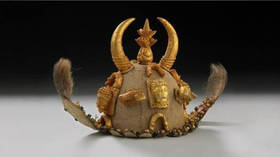British Museum faces probe for hiding sacred artefacts
The institution allegedly failed to disclose key details about Ethiopian Orthodox altar tablets looted in the 1860s
The British Museum is under investigation for allegedly hiding a collection of sacred Ethiopian artefacts from public view for more than 150 years, a watchdog that gathers information on cultural restitution reported on Sunday.
The probe by the UK Information Commissioner’s Office (ICO) follows a complaint from Returning Heritage that the museum failed to disclose key details about the items – which include altar tablets known in the East African nation’s Orthodox church as tabot – in response to a freedom of information (FoI) request filed last August.
“It seems very strange that the museum would not wish to explain why they’re holding on to objects that they can return,” said Lewis McNaught, managing editor for the Returning Heritage non-profit organization, as cited by the Guardian.
The 11 wood and stone tabots, looted by British soldiers after the Battle of Maqdala in 1868, have never been on public display and are considered sacred enough that even the museum’s curators and trustees are reportedly prohibited from examining them. The Ethiopian Orthodox Church believes that only its priests should be able to view the items that symbolically represent the Ark of the Covenant – the wooden chest is said to have held the Ten Commandments. They are reportedly kept in a sealed storeroom in the Bloomsbury complex’s basement.
In 2019, the landlocked East African nation’s Culture Ministry requested the return of the artefacts, when a delegation visited the British Museum. According to the Art Newspaper, a museum spokeswoman stated at the time that the board of trustees would consider a long-term loan of the tabots, as British laws prohibit museums from permanently returning contested artefacts to their original owners.
However, Returning Heritage believes the tabots could lawfully be returned to Ethiopia without breaching the British Museum Act.
“The act is very explicit that the museum [can’t] return objects,” McNaught said, adding, however, that “there are some legal exemptions within the act. And one of those exemptions allows the trustees to return certain items if they consider them ‘unfit to be retained’.”
Museums in the UK have been facing growing pressure to return items stolen during the colonial era to their countries of origin. In January, the British Museum and Victoria and Albert Museum announced that more than 30 Asante ‘crown jewels’, gold artifacts that once belonged to the royals of Asante (or Ashanti) in modern-day Ghana, would be returned to the West African nation’s owners in April following a loan deal.
You can share this story on social media:








Comments are closed.